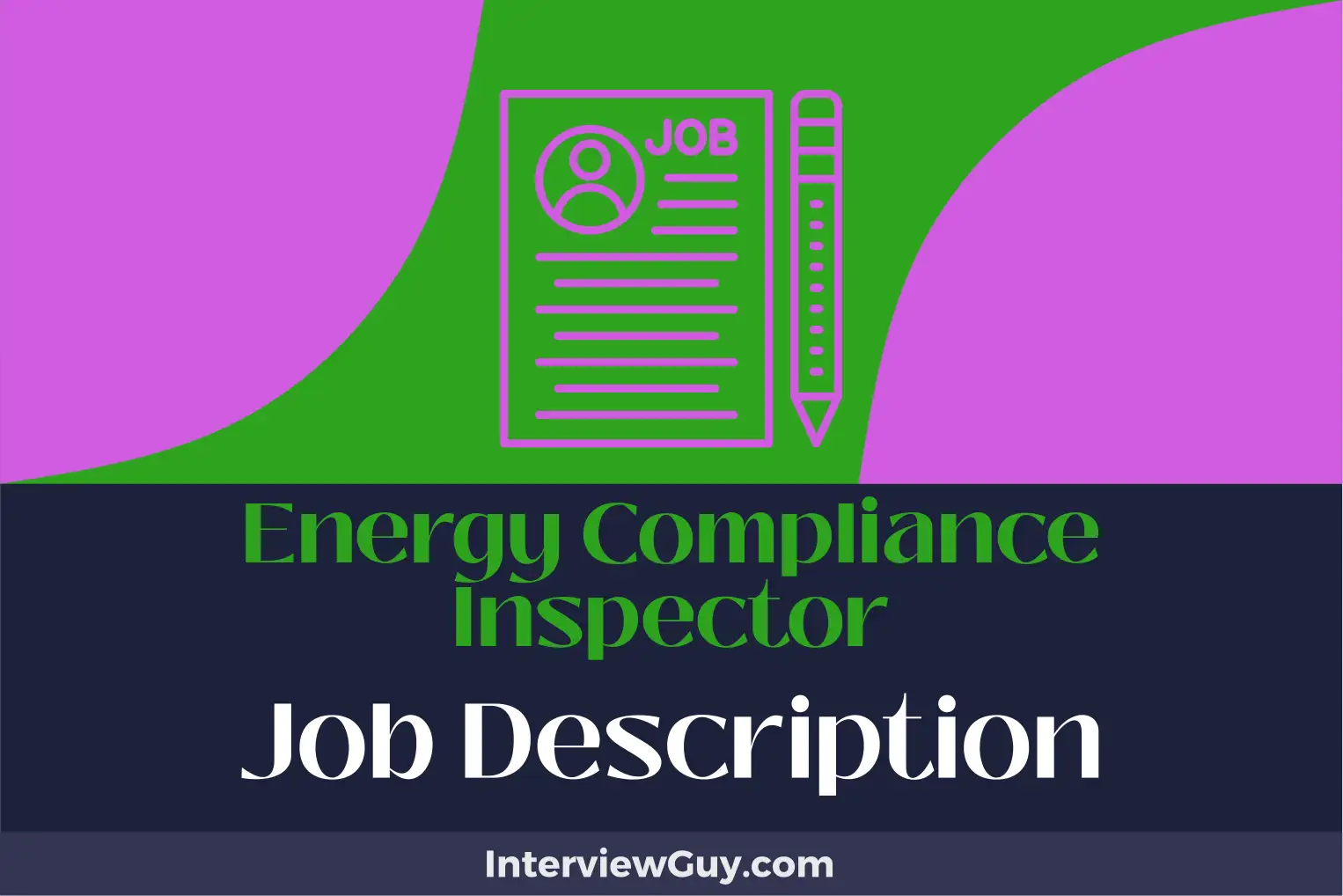Energy Compliance Inspector Job Description [Updated for 2026]

In the modern era, the focus on energy compliance inspectors has never been sharper.
As our world leans more towards sustainable practices, the demand for proficient individuals who can ensure, enhance, and protect our energy compliance standards increases.
But let’s delve deeper: What’s truly expected from an energy compliance inspector?
Whether you are:
- A job seeker trying to understand the core of this role,
- A hiring manager outlining the perfect candidate,
- Or simply fascinated by the intricacies of energy compliance,
You’re in the right place.
Today, we present a customizable energy compliance inspector job description template, designed for seamless posting on job boards or career sites.
Let’s dive right into it.
Energy Compliance Inspector Duties and Responsibilities
Energy Compliance Inspectors carry out an array of tasks primarily aimed at ensuring the compliance of energy systems and processes with relevant environmental and safety regulations.
Their primary responsibilities include:
- Examining plans and specifications for new projects to ensure they meet local, state, and federal energy efficiency regulations
- Conducting on-site inspections of new and existing buildings, facilities, and equipment to ensure compliance with energy codes and standards
- Identifying energy inefficiencies and suggesting improvements
- Writing detailed reports on energy inspections, outlining any issues and their recommended solutions
- Enforcing energy regulations and issuing violations notices if necessary
- Communicating with property owners, contractors, and other relevant parties about energy compliance issues
- Keeping up-to-date with new technologies and developments in the energy sector
- Maintaining records of inspections and compliance-related activities
- Conducting training sessions and workshops on energy compliance matters for various stakeholders
Energy Compliance Inspector Job Description Template
Job Brief
We are seeking a dedicated Energy Compliance Inspector to perform comprehensive inspections of energy systems.
The Inspector will review plans, perform inspections, and issue reports on energy efficiency, renewable energy systems, and energy conservation measures in new and existing buildings.
Our ideal candidate has a strong understanding of local, state, and national energy regulations and is dedicated to ensuring compliance.
Responsibilities
- Conduct on-site inspections of various properties and energy systems
- Ensure all inspected properties meet energy efficiency and conservation standards
- Prepare and present detailed inspection reports
- Analyze and interpret energy data, building plans, and specifications
- Communicate effectively with property owners, contractors, and other stakeholders
- Stay up-to-date with changes in energy regulations and industry best practices
- Assist with energy efficiency training and workshops
- Identify opportunities for energy conservation and efficiency improvements
Qualifications
- Proven work experience as an Energy Compliance Inspector or similar role
- Knowledge of local, state, and national energy codes and standards
- Familiarity with energy management systems and technologies
- Excellent analytical and problem-solving skills
- Strong written and verbal communication abilities
- Ability to work independently and make sound decisions
- Proficiency in Microsoft Office Suite and energy modeling software
- Certification as an Energy Inspector or Auditor is preferred
- A degree in Engineering, Environmental Science, or a related field is advantageous
Benefits
- 401(k)
- Health insurance
- Dental insurance
- Retirement plan
- Paid time off
- Training and development opportunities
Additional Information
- Job Title: Energy Compliance Inspector
- Work Environment: Field and office-based work. Frequent local travel may be required.
- Reporting Structure: Reports to the Energy Compliance Supervisor or Manager.
- Salary: Salary is based upon candidate experience and qualifications, as well as market and business considerations.
- Pay Range: $58,000 minimum to $85,000 maximum
- Location: [City, State] (specify the location or indicate if remote)
- Employment Type: Full-time
- Equal Opportunity Statement: We are an equal opportunity employer and value diversity at our company. We do not discriminate on the basis of race, religion, color, national origin, gender, sexual orientation, age, marital status, veteran status, or disability status.
- Application Instructions: Please submit your resume and a cover letter outlining your qualifications and experience to [email address or application portal].
What Does an Energy Compliance Inspector Do?
Energy Compliance Inspectors typically work for government agencies, utility companies, and consulting firms, ensuring that organizations comply with national and regional energy efficiency standards and regulations.
Their primary role is to inspect and evaluate buildings, industrial operations, and power generation facilities to verify compliance with energy conservation standards.
This includes checking the efficiency of HVAC systems, insulation, lighting, and other energy-related components.
They also analyze a building’s blueprints or technical plans to ensure that the energy systems comply with the applicable codes and standards.
They often use specialized equipment and software to assess energy usage and efficiency.
Furthermore, they provide guidance and recommendations to improve energy efficiency and reduce energy costs.
This could include suggesting upgrades to existing systems or the implementation of alternative energy solutions.
Energy Compliance Inspectors are responsible for preparing and presenting detailed reports on their findings, including any violations and corrective actions needed.
In some cases, they may also be required to train or educate individuals or organizations on energy efficiency, conservation methods, and compliance requirements.
Energy Compliance Inspector Qualifications and Skills
An Energy Compliance Inspector should have the skills and qualifications that meet the requirements of the role, such as:
- Technical knowledge and understanding of building energy systems and renewable energy technologies.
- Strong understanding of energy codes, standards and regulations, and the ability to interpret and apply them accurately.
- Excellent inspection skills to ensure compliance with energy efficiency, renewable energy and building performance standards.
- Strong problem-solving skills to identify energy compliance issues and propose effective solutions.
- Excellent communication skills to clearly explain compliance issues, provide recommendations, and work effectively with various stakeholders, such as property owners, contractors, and government agencies.
- Detail-oriented and analytical thinking skills to accurately assess buildings’ energy performance and identify areas for improvement.
- Professional certification in energy auditing or a related field is typically required.
- Physical abilities that allow them to conduct on-site inspections, which may include climbing ladders, walking on roofs, and navigating tight spaces.
Energy Compliance Inspector Experience Requirements
To become an Energy Compliance Inspector, individuals often start with a degree in Engineering, Environmental Sciences, or a related field to establish a solid foundation in the principles of energy and the environment.
This academic background is typically followed by 1 to 2 years of work experience in a relevant field, often gained through internships or entry-level roles in energy auditing, environmental consulting, or engineering.
Initial experience may involve tasks such as data collection, report writing, and compliance checking under the supervision of more experienced professionals.
During this time, inspectors become familiar with the legislation and regulations related to energy compliance, as well as the specific methods for inspecting and evaluating various energy systems.
For more advanced positions, such as senior or lead inspectors, employers may require 3 to 5 years of experience in energy compliance inspection.
These professionals are expected to have in-depth knowledge and understanding of energy efficiency standards and principles, and be able to manage more complex inspection tasks, including planning and coordinating inspections, as well as training and supervising junior inspectors.
Furthermore, many employers prefer Energy Compliance Inspectors to hold a professional certification, such as the Certified Energy Manager (CEM) or Certified Energy Auditor (CEA) credential, which demonstrates a high level of expertise and commitment to the profession.
Additionally, experience with specific software tools, such as energy modelling or data analysis software, may also be required, depending on the specifics of the role.
Energy Compliance Inspector Education and Training Requirements
Energy Compliance Inspectors typically hold a bachelor’s degree in engineering, environmental science or a related field.
Comprehensive knowledge in energy conservation, sustainable practices, and building codes are usually essential.
It is often necessary for inspectors to understand and interpret federal, state and local energy codes and standards.
Some inspectors may also need a background in mechanical or electrical systems, particularly for jobs involving complex industrial settings.
While not always required, many employers prefer candidates with a Certified Energy Manager (CEM) or a Certified Energy Auditor (CEA) certification.
These certifications indicate a high level of competence in energy management and auditing practices.
A good portion of states require Energy Compliance Inspectors to obtain a work license.
Licensing criteria vary, but generally require individuals to be 18 or older, have completed high school or equivalent education, and graduated from a state-recognized program or have equivalent work experience.
Continuing education is vital in this field due to constantly evolving energy codes and standards.
Therefore, Energy Compliance Inspectors often pursue advanced courses or attend workshops to stay updated.
Energy Compliance Inspector Salary Expectations
An Energy Compliance Inspector earns an average salary of $67,340 (USD) per year.
However, this salary can vary depending on the inspector’s level of experience, additional qualifications, and the region in which they are employed.
Energy Compliance Inspector Job Description FAQs
What skills does an Energy Compliance Inspector need?
Energy Compliance Inspectors need to have a strong understanding of environmental and energy laws, regulations, and standards.
They need analytical skills to assess data and problem-solving skills to identify and rectify any compliance issues.
Strong communication skills are also necessary to report findings and advise on solutions.
A keen eye for detail is important for detecting non-compliance issues.
Do Energy Compliance Inspectors need a degree?
Most Energy Compliance Inspectors will need a degree in a relevant field, such as environmental science or engineering.
However, experience in energy or environmental compliance can also be valuable.
Many employers also require inspectors to be certified by an industry-recognized body, which often involves passing an examination.
What should you look for in an Energy Compliance Inspector resume?
Look for a degree in a relevant field and certification by an industry body.
Experience in energy compliance and a good understanding of environmental laws and regulations are also key.
Other desirable qualities might include good analytical skills, excellent attention to detail, and strong communication skills.
What qualities make a good Energy Compliance Inspector?
A good Energy Compliance Inspector is meticulous and has a keen eye for detail, as they must identify even the smallest non-compliance issues.
They should be diligent, as they are responsible for ensuring that all regulations and standards are met.
Strong communication skills are important for reporting findings and advising on solutions.
A commitment to environmental sustainability is also a valuable quality.
What are the daily duties of an Energy Compliance Inspector?
On a typical day, an Energy Compliance Inspector may conduct site visits to inspect energy systems and their compliance with regulations.
They may also spend time reviewing data from energy monitoring systems, identifying any anomalies that could indicate non-compliance.
Part of their day may be spent writing up reports on their findings and advising on corrective actions.
They may also meet with other compliance staff to discuss issues and collaborate on solutions.
Conclusion
There you have it.
Today, we’ve illuminated the intricate details of what it truly means to be an Energy Compliance Inspector.
Surprise!
It’s not just about assessing energy efficiency and compliance.
It’s about forging the path towards a more sustainable future, one energy audit at a time.
Equipped with our comprehensive Energy Compliance Inspector job description template and real-world examples, you’re ready to make your mark.
But why limit yourself?
Venture further with our job description generator. It’s your ultimate tool for crafting laser-precise job listings or honing your resume to perfection.
Remember:
Every energy audit contributes to our collective sustainability goal.
Let’s create that sustainable future. Together.
How to Become an Energy Compliance Inspector (Complete Guide)
Bulletproof Careers: The Most Recession-Proof Jobs Out There
Path to Prosperity: How to Secure the Highest Paying Jobs This Year!

![Communications Payload Engineer Job Description [Updated for 2026]](https://interviewguy.com/wp-content/uploads/2024/05/communications-payload-engineer-job-description-768x512.webp)
![Dinosaur Bone Caster Job Description [Updated for 2026]](https://interviewguy.com/wp-content/uploads/2024/05/dinosaur-bone-caster-job-description-768x512.webp)


![Cryptographic Algorithm Designer Job Description [Updated for 2026]](https://interviewguy.com/wp-content/uploads/2024/05/cryptographic-algorithm-designer-job-description-768x512.webp)
![Casino Bartender Job Description [Updated for 2026]](https://interviewguy.com/wp-content/uploads/2024/05/casino-bartender-job-description-768x512.webp)